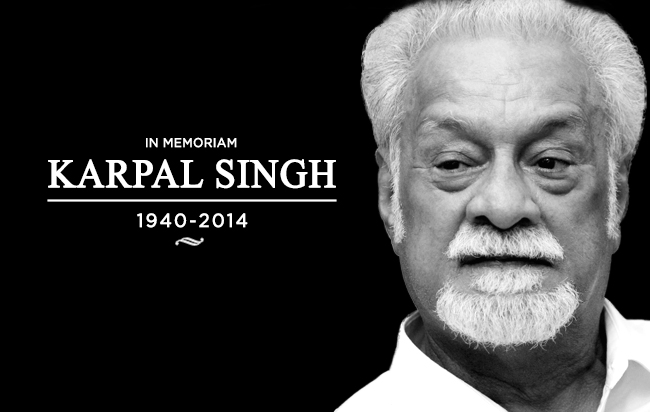
Karpal Singh - or just plain 'Karpal' - was already a legend when I first started work as a young lawyer at Skrine&Co in the late 80's.
There would be a frisson of excitement and drama for us juniors if Karpal was in town. We'd slip into the courtroom and watch him at work. He was a tall, imposing man: impressive-looking and seemingly without fear as he tackled what were thought to be the 'impossible' cases defending Barlow and Chambers, confronting DP Vijandran.
As I looked on, I always felt that whilst we were chasing 'bill-able' hours and servicing corporate clients, he was making history.
By the time I'd started writing full-time, Karpal's importance had grown even further. He had become a staunch and unflinching advocate of justice as well as a secular Malaysia: consistent and questioning to the very end.
I can still remember gate-crashing a large but enormously affable celebratory gathering of Pakatan Rakyat supporters in Puchong after the historic 2008 General Elections.
First, the crowd erupted as Teresa Kok arrived, providing her with a tumultuous welcome. As a certified DAP 'darling' one wouldn't have expected anything less. Minutes later, Karpal turned up with his family. Having not seen him for years, I was a little shocked by how much smaller he was physically - a result of car accident in 2005. Whilst diminished in terms of size he posessed a certain aura - calm and benign - sitting in his wheel-chair as the crowd all around him went wild - the enthusiasm as raw and excitable as anything Teresa had inspired.
Given that the crowd was almost entirely ethnic Chinese, I was eager to understand why he'd been so lionized and so I asked one of the guests.
She answered simply: "We love him because he represents all of us: rich or poor, Chinese, Malay or Indian. He is brave and honest."
Karpal Singh's was truly a Malaysian life. His political journey began in 1974 after he was elected as the state assemblyman for Alor Setar. Later on, he clinched the Jelutong parliamentary seat in 1978, which he held until 1999 – until he was dubbed as the famous ‘Tiger of Jelutong’.
He was also the state assemblyman of Bukit Gelugor from 1978-1990. Eventually, he was elected as the Member of Parliament for Bukit Gelugor in 2004 and successfully defended his seat in the 2008 and 2013 elections.
As a politician, he was not free from controversy. Blistering in attack, he was the kind of man who called a spade a spade and then proceeded to hit an adversary over the head with the same spade.
Back in the days when there were only a few rows of opposition benches and long before Nurul Izzah, Tony Pua and Rafizi Ramli had surfaced, Karpal was a dramatic presence enlivening and informing our public debates going head-to-head with likes of Tun Mahathir Mohammad and the then Deputy Prime Minister Anwar Ibrahim.
He spoke out strongly against the concept of Islamic state and the implementation of Hudud laws. Whilst this was to strain relations between PAS and DAP it reflected a fundamental ideological difference that he was unafraid to tackle.
Whilst there were some who saw his steadfast refusal to accept Hudud as ‘anti-Muslim’ or ‘anti-Malay’, the reality was that he belonged to a generation that was committed to a broader and infinitely more inclusive 'Malaysian' identity.
Karpal suffered considerably for his courage and steadfastness. In 1987 he was arrested under the now abolished-ISA during Operation Lalang. Earlier this year, he was found guilty of sedition – a court decision which Karpal himself had calmly accepted.
Still, no one can deny his eagle-eyed focus on the truth as fought against injustice, shaping the political landscape.
In a Malaysia whose leaders increasingly cannot say what they mean - or worse yet, even mean what they say, the loss of his candour and sharp legal mind is a blow to the nation.

















